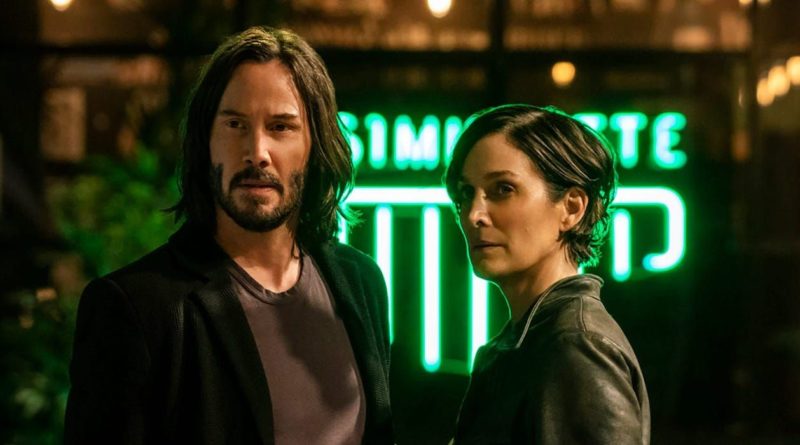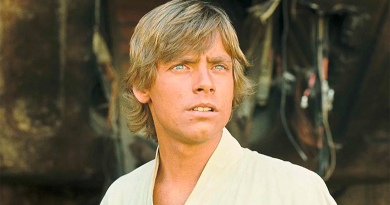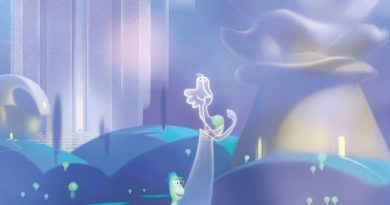‘The Matrix Resurrections’ Review: Feeling Undead
Warning: Contain’s mild spoilers for The Matrix Resurrections and major ones for the original trilogy.
When it comes to questioning people’s decisions, I always try to give Lana Wachowski the benefit of the doubt. She, along with her sister, is one of the most earnest filmmakers out there, and is keenly aware of the cynicism present in the film industry’s current reboot/remake/sequel-laden atmosphere while actively resisting it. That said, I don’t know why The Matrix Resurrections exists, and the movie itself doesn’t seem to either, at least at first, and in some sense the film’s narrative is an attempt to figure that out.
Much as the film doesn’t know why it’s here, neither does Neo (Keanu Reeves) who finds himself once again trapped in the computer simulation called the matrix, under his old Thomas Anderson monicker. This time he’s a game designer, whose crowning achievement is a trilogy of games called The Matrix, whose content is the first three movies. It creates plenty of opportunities for self-referential commentary, as the film analyzes the legacy and themes of the first three films openly while also questioning the need for a fourth. Neo is also plagued by dreams of the original trilogy, secretly believing that the content of his games is really the story of his life. The breaking point comes when he begins running into Trinity (Carrie-Anne Moss) again and Warner Bros (yes, the movie studio) brings him in to make a Matrix 4 game, in spite of his opposition to further sequels.
Those who watched the original trilogy will have plenty of questions like: How are Neo and Trinity alive? Why is Morpheus so young? Isn’t the man-machine war over? All these questions get answered, but the answers aren’t very consequential. Newcomers to the series will have other questions like: What the fuck is going on and what is all this about? One of the film’s biggest issues is that the plot makes absolutely no sense without having seen the first three movies, providing interesting fodder for existing fans, but likely turning away any new viewers.
What follows is a fast-paced 140 minute romp as the previously dead Neo and the previously dead franchise must find a new meaning out of their respective resurrections. While it is packed to the gills with references, cameos, and the return of classic characters, they are all familiar yet different, and lacking the spunk and personality that made them so fun in the first place. The same goes for the many new characters, who are performed admirably by their respective actors, but come off as hollow due to the writing. There’s plenty of action, which again falls a bit short. It brings back some of the influence of the original, but feels much more modern, and as such, worse and less comprehensible. The Hong-Kong inspired staging and camerawork as well as the magnificent set pieces are largely gone, with much of the action feeling jumbled and uninspired to fit with modern tastes in spite of the obvious effort that went into its execution.
My biggest issue with Resurrections extends from the problems with its action scenes. The Matrix trilogy, while deeply flawed, is hyper-stylized in the best way possible. In spite of their many imitators, the original movies still have a look a feel that is totally unique, and each creative choice, all the way down to how each shot is color graded, exudes an intentionality and thoughtfulness that is ultimately what gives the franchise its personality and what makes it so widely devoured by those who look for the meaning in its many careful details. Resurrections, across the board and not just in the action scenes, feels like something corporate, scrubbed of that inventiveness and character that made it so iconic while showing audiences all the familiar sights we expect.
Yet the film seems at least somewhat aware of this. Just as the franchise has returned in a corporatized form, the matrix itself has been rebooted, remixing the old in slightly new ways. The machines who oversee the human power plants and the matrix are referred to as “suits” and are spoken about much like businessmen or film producers. The film’s main villain is a middle-management AI, who fancies himself as something of an artist, and who acts as a new version of The Architect from the original trilogy, cynically rebooting and retooling the matrix to please his machine masters while also using it as an opportunity to climb the quasi-corporate ladder of the machine world.
The performances are all solid, never really getting enough time to shine or do a lot of work as they are here to serve the plot, but never calling attention to themselves in a bad way. Keanu and Carrie-Ann Moss seem totally at home in their old characters, while Yahya Abdul Mateen II seems to be having a grand-old time doing his Morpheus impression. The biggest standout is Jonathan Groff, who plays the original trilogy’s anarchic villain, Agent Smith. His performance is over-the-top in the best way, as Smith plays the spoiler, an unreliable third party in the central conflict between Neo and the new matrix, hoping to exploit the chaos to fulfill his long-standing desire for freedom. One major issue is that some of the dialogue in the film is difficult to understand. Both Lambert Wilson (returning as The Merovingian) and Jessica Henwick (as the newcomer Bugs) have a tendency to mumble large sections of their lines which, combined with their respective French and English accents, can make them awfully hard to understand.
Like many films these days, The Matrix Resurrections is a very self-aware sequel/reboot that comments endlessly on its own strange existence. However it succeeds where others like Jurassic World failed by critically examining its own making and putting together a case for more sincere filmmaking, asking people to free their own minds of the traps of nostalgia and to have the courage to create something daring and new. This is a great idea, if only the film itself was able to really follow through on it. It is chock full of interesting tangential ideas and little details to chew on, but doesn’t really entertain as much as it needs to. In the end, while watching this movie I felt much like Neo trying to remember his past life: everything looks familiar, but it all feels wrong.




